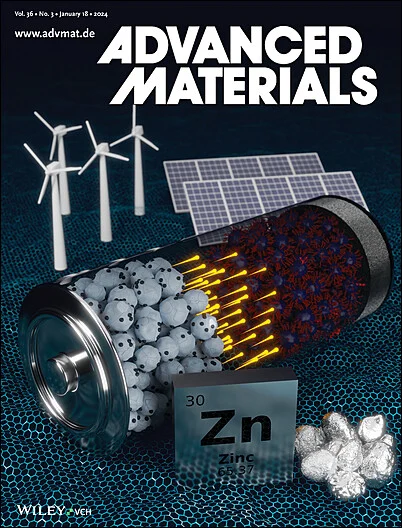人工智能引导下精确治疗耐药细菌感染的抗菌肽水凝胶设计
IF 27.4
1区 材料科学
Q1 CHEMISTRY, MULTIDISCIPLINARY
引用次数: 0
摘要
传统的生物材料开发缺乏系统性和可预测性,在解决与耐药细菌感染相关的复杂工程问题方面提出了重大挑战。人工智能(AI)管理复杂系统的前所未有的能力为材料开发提供了一种新的范例。然而,目前还没有基于深入了解生物材料与细菌相互作用的AI模型来指导抗菌生物材料的开发。本研究开发了一个ai引导设计平台(AMP-hydrogel-Designer)来生成抗菌生物材料。该平台利用生成式设计和多目标约束优化,生成了一种新型的含硫醇高效抗菌肽(AMP),该抗菌肽与水凝胶功能偶联,形成复杂的网络结构。此外,还加入了cu修饰的钛酸钡(Cu-BTO),通过Cu2+/SH配位进一步促进复杂交联,从而制备出ai - amp水凝胶。在体外,ai - amp水凝胶表现出>;对耐甲氧西林金黄色葡萄球菌(MRSA)和大肠杆菌(E. coli)杀菌效果99.99%。此外,Cu-BTO将机械刺激转化为电信号,从而促进生长因子的表达和血管生成。在具有动态伤口的大鼠模型中,AI-AMP水凝胶显著减少MRSA负荷并显著加速伤口愈合。因此,人工智能引导的生物材料开发战略为精确治疗耐药细菌感染提供了一种创新的解决方案。本文章由计算机程序翻译,如有差异,请以英文原文为准。

AI-Guided Design of Antimicrobial Peptide Hydrogels for Precise Treatment of Drug-resistant Bacterial Infections
Traditional biomaterial development lacks systematicity and predictability, posing significant challenges in addressing the intricate engineering issues related to infections with drug-resistant bacteria. The unprecedented ability of artificial intelligence (AI) to manage complex systems offers a novel paradigm for materials development. However, no AI model currently guides the development of antibacterial biomaterials based on an in-depth understanding of the interplay between biomaterials and bacteria. In this study, an AI-guided design platform (AMP-hydrogel-Designer) is developed to generate antibacterial biomaterials. This platform utilizes generative design and multi-objective constrained optimization to generate a novel thiol-containing high-efficiency antimicrobial peptide (AMP), that is functionally coupled with hydrogel to form a complex network structure. Additionally, Cu-modified barium titanate (Cu-BTO) is incorporated to facilitate further complex cross–linking via Cu2+/SH coordination to produce an AI-AMP-hydrogel. In vitro, the AI-AMP-hydrogel exhibits > 99.99% bactericidal efficacy against Methicillin-resistant Staphylococcus aureus (MRSA) and Escherichia coli (E. coli). Furthermore, Cu-BTO converts mechanical stimulation into electrical signals, thereby promoting the expression of growth factors and angiogenesis. In a rat model with dynamic wounds, the AI-AMP hydrogel significantly reduces the MRSA load and markedly accelerates wound healing. Therefore, the AI-guided biomaterial development strategy offers an innovative solution to precisely treat drug-resistant bacterial infections.
求助全文
通过发布文献求助,成功后即可免费获取论文全文。
去求助
来源期刊

Advanced Materials
工程技术-材料科学:综合
CiteScore
43.00
自引率
4.10%
发文量
2182
审稿时长
2 months
期刊介绍:
Advanced Materials, one of the world's most prestigious journals and the foundation of the Advanced portfolio, is the home of choice for best-in-class materials science for more than 30 years. Following this fast-growing and interdisciplinary field, we are considering and publishing the most important discoveries on any and all materials from materials scientists, chemists, physicists, engineers as well as health and life scientists and bringing you the latest results and trends in modern materials-related research every week.
 求助内容:
求助内容: 应助结果提醒方式:
应助结果提醒方式:


